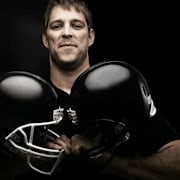Mastering Fear: How to Harness Anxiety Like Elite Athletes and Soldiers

In my conversation with John McPhee on Power Athlete Radio, we dove deep into the complex nature of fear - a feeling that everyone faces, but one that changes and evolves as we gain more experience. Fear is never just one thing - it has different layers depending on the situation. There's fear of the unknown, like the anxiety that hits before stepping into something new and uncertain. There's fear of combat or direct confrontation, a very raw kind of fear that can strike in moments of extreme challenge. And then there's the ever-present fear of failure, something that holds so many people back from reaching their full potential. Each form of fear has its own flavor, but learning to manage them effectively is key.
Early in life, fear can feel overpowering. Imagine a young NFL player stepping onto the field for the first time, the stadium buzzing, the stakes higher than they’ve ever been. That fear can be all-consuming, so intense it can be hard to think clearly. I saw it happen many times. But as we grow and gain experience, the nature of fear changes. For soldiers, in combat, or in any high-stakes arena, those pre-game jitters aren't about fear anymore. Instead, they're about the drive to perform well. Soldiers have had countless “swings at the bat,” so to speak. They know what to expect and, importantly, how to channel those emotions productively. It’s not that fear vanishes; it just becomes something more manageable, more familiar, and less paralyzing.
A key point John and I discussed is that fear never truly goes away. It’s something you get used to, but it's always there. Early on, fear can feel almost debilitating, but over time, you learn to manage it better. For those of us who guide young people into high-stress environments, whether they're athletes or soldiers, our job is to help them handle that initial wave of fear. It’s all about showing them the tools they need to process those intense emotions rather than letting fear control them.
One of the most important lessons I’ve learned in my tenure in the NFL that I try to pass on to others, is that emotions, fear included, come in waves. In high-stakes situations, it’s not uncommon to experience fear, anger, sadness, and joy all in a short period. Emotions can hit you with a force, especially when the stakes are high, and learning to handle this emotional turbulence is crucial. The goal is not to be immune to these waves but to ride them, like learning to surf. Fear might be there, but with enough practice, you develop the skill to stay balanced and keep moving forward without letting each wave dictate your next action.
As you gain more experience, you begin to ride these waves of fear, frustration, and even joy without getting overwhelmed by them. You learn to let the emotions pass through, understanding that they’re part of the process rather than obstacles to avoid. Fear, instead of being a burden, becomes another natural part of the experience - just a momentary feeling rather than an immovable wall. It’s about recognizing that the wave will pass, and then focusing on the emotions and motivations that keep you grounded. Fear, for all its intensity, is temporary, and it’s possible to train yourself to navigate it without losing focus on what really matters.
So, while fear might be inevitable, it’s always manageable. And once you start seeing it as something you can handle rather than something to avoid, you free yourself up to perform at your best. Whether you’re stepping onto a battlefield, a sports field, or a stage, managing fear is about mastering those emotional waves so they don’t knock you down but propel you forward. Embracing this mindset is a powerful shift that allows you to face each challenge with a level of confidence and resilience that fear alone can’t touch.
